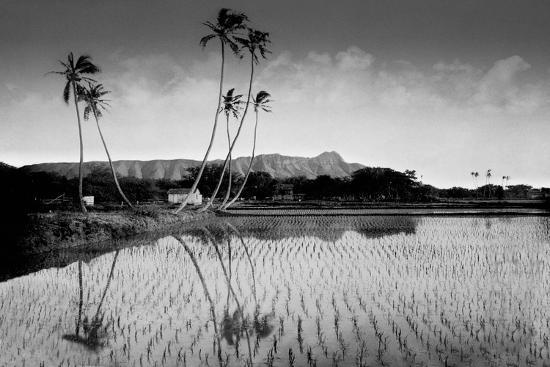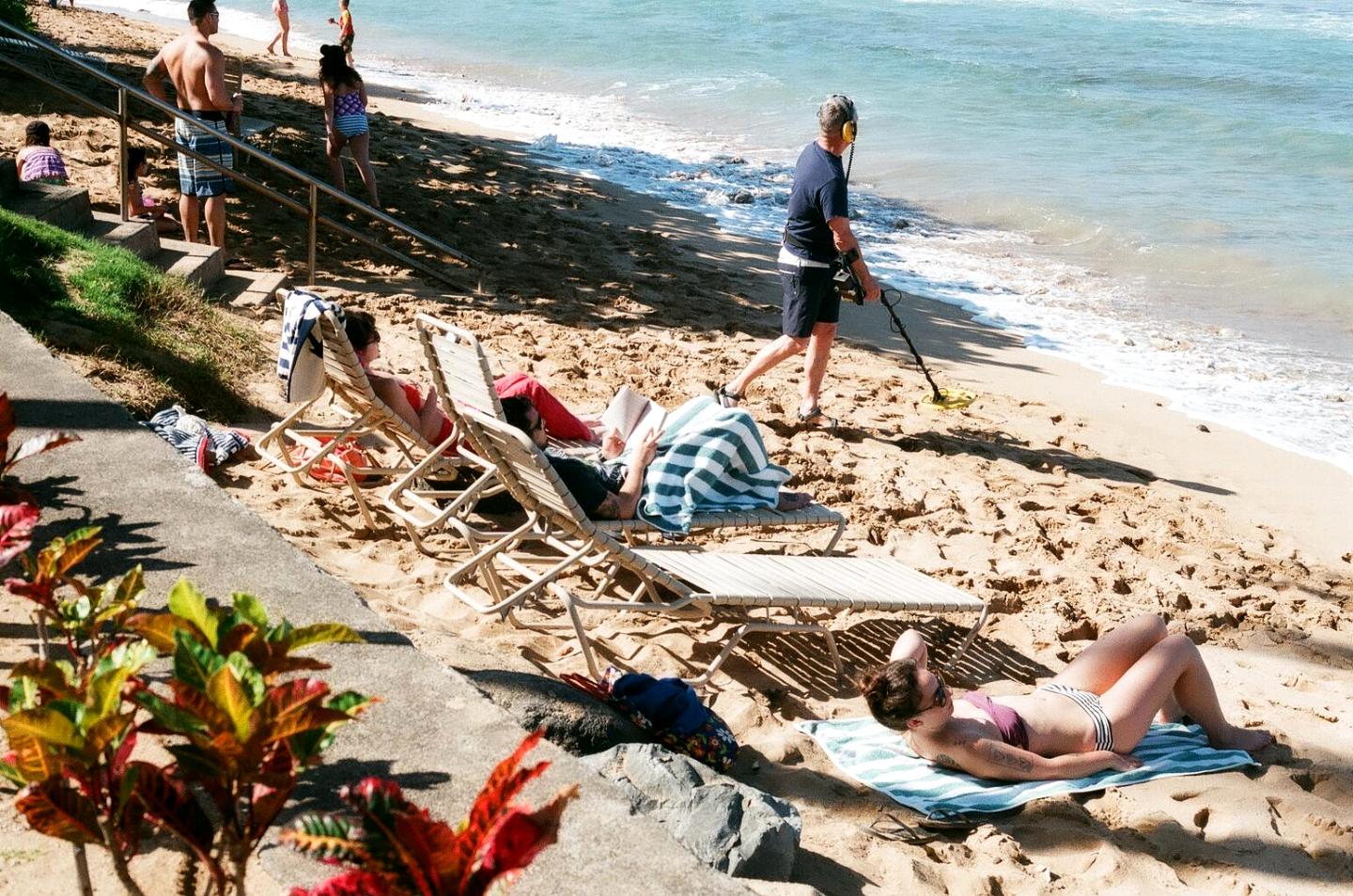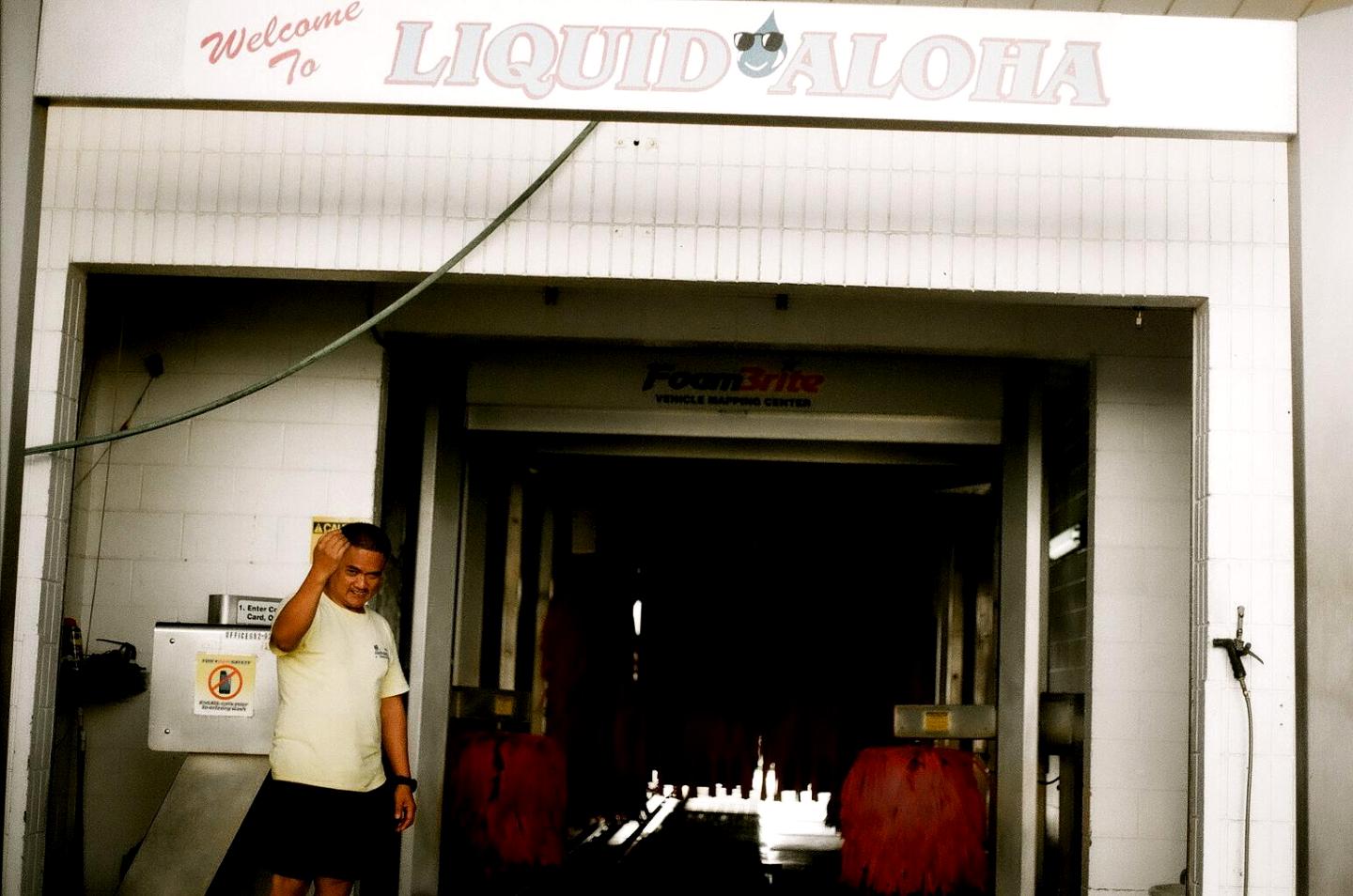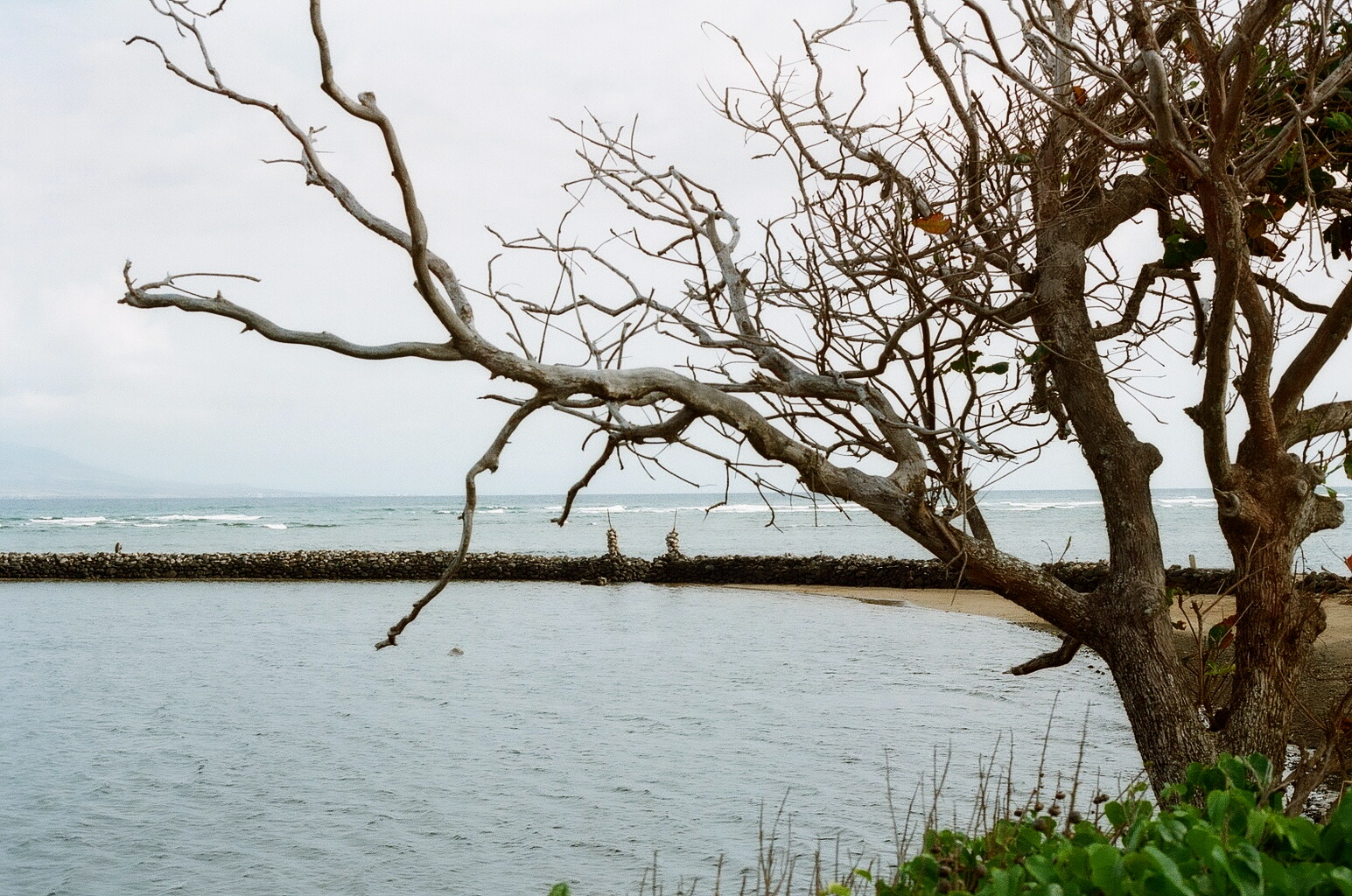Na Moʻolelo — Stories
 Ānuenue, Maui
Ānuenue, Maui E komo mai a Hawai’i — Welcome to Hawai’i
“Living in limitless June, our senses make substitutes for the seasons. We know wonders of pasteled coral clusters, our world is necklaced with surf–strings. We move along soft, sudden rain caresses and our lives are stippled with ginger flower scents in briny surf tastes. Behind us ropy waterfalls cascade thousands of feet to overflow the deep, dark valley pools, to wander and feed the fertile earth and, shimmering over pebbled shallows, to make music on their fretted journey to the sea...

...Living on isolated islands, we cherish our diversities. For we have come from many places and in many different ways to this enormous yet intimate chamber of summer...

Napoʻo ʻana o ka lā

... It all begins with journeying. The visitor flies in search of the sun across the time zones, and his first discovery is that his biological clock has gone wrong. He leaves the jet feeling as though his soul is still strapped in the seat. He has lost his guidebook and he cannot trust his senses. The welcoming smile seems real, but isn't the welcoming lei plastic? All the way in from the airport it is used car lots and pizza parlors, and he has seen those before. From the hotel he is likely to see another hotel. If he is luckier he manages a private panorama, but even this looks two-dimensional because he has seen it before as well – on picture postcards...

Waikīkī, O’ahu c. 2017
...The first night he drinks and dines by torchlight. But as the tradewinds shift, the torch blows kerosene smoke in his face, and the brown skinned girl with a flower in her hair, serving him a Missionary’s Downfall in the dusk with the light behind her, turns out to be a Southern Californian recently transplanted. He feels he has come a long way and arrived…where?


Waikīkī, O’ahu c. 1890 & 2017
...He sleeps badly, dreams unsuitably of the mating of elephants and wakes to the pounding of a steam piledriver outside his window: it is building still another hotel. On the beach he dozes again. The sand is warm, the waves make small comforting sounds. He wakes, and the sky is an improbable laundered blue above him. He lifts his head and catches sight of a profound green palm and in the distance a yearning amethyst mountain. He feels somehow different; he does not know why. He thinks, fearfully, that the sun must have poached his brain. Then he realizes that he has made a journey. He has arrived, his soul has caught up with him, and he is sure he will be happy every minute from now on for as long as he is an islander, even if it is only 72 hours.”

Māla, Maui
Island Intricacy
“Hawai’i is not an uncomplicated place. The potential deadly danger of falling coconuts coupled with the dancing of the fronds speaks to extremes incased in such a realitively small grouping — be it trees or islands. The creation and beauty that melts hand in hand into the destruction and volitility inherent to the geological history of the area is both honoured and feared. The same wave that forcefully crashes on shore has silently travelled miles in beautiful succession...

...The members of the human faction that have found their way to the islands are in no less disunion. Early traditions abolished by means of force and deceit in order to make way for contemporary convenience and luxury. Quests to seek simplicity are pioneered in conjunction with a vast strategic military base. The wettest place on the planet is surrrounded by salt.” — Hawai’i: A Once Hidden Haven

Today & Yesterday
“Like all who came before, we brought our big and little dreams, our prejudices, suspicions and hungers. We carried our talismans and trinkets — good luck pieces, rosaries, Stars of David, Bibles and wallet snapshots. Some guarded their toolboxes as if they were precious portable altars.
There were those of us who loved it here from the first and have stayed. There were those of us who saw and felt little outside the nightly crap games and the paydays. They saved for the stake and when they made it, they left.

For those whose minds run that way, the outlandish still abound. But somehow things refuse to stay merely picturesque. A fisherman stands motionless on a reef, the throw net on his shoulder a nylon copy of the sennet snare woven by ancient kānaka maoli. Still as a sculpture, he waits. The scene composes itself beautifully. Then, behind him, a noisy motorboat tows a water skier across the line of vision, and all is lost.

The sensible man learns to cope with this, and becomes instead a connoisseur of reversed expectations. The present pushes the past out of sight, and the past pushes back everyday, everywhere. On a cliff trail a donkey edges along under the weight of wet bags of poi from taro patches in a quiet green valley; the paste will be packaged in plastic and sold in supermarkets.
 Liquid Aloha
Liquid AlohaThe Chinese have taken over New Year. They have their lunar celebrations in Chinatown, with paper lions; but on everybody else’s New Year’s Eve as well, fireworks go off, millions of them; towns sound as if they are under siege. May we all live a thousand years.

A’ole Niu
It has all happened fast, almost too fast to comprehend.”
 Ki Māla
Ki MālaNa Kahu — The Guardians
“The kahus still exist. They are guardians, keepers of the sacred places, the burial caves of the ali’i, the temples of old. Almost always they are old people — in areas not easily reached. They may live as farmers or fishermen but they also live a greater responsibility...
How can you tell who they are?

Moloka’i
...Usually it is an old man sitting alone. He has finished his work of homage, cleaning the sacred place, and he is sitting by himself after his labor. He may even be chanting, but silently. You will not hear it. Most times he will be neatly dressed, in respect — this old man sitting by himself in a field, a lonely place...
How does one talk to him?

...Quietly, pleasantly, with no show, no anxiety. And you must never fold arms or hold your hands behind your back or place them on your hips. These are signs of arrogance and disrespect, even if not meant to be. A kānaka maoli will understand, but he is very sensitive to gestures. An old one speaks a great deal with his hands and his eyes. The movements of fingers will have meaning to him. It is best to stand with hands hung by the thighs and you must never ask direct questions. Talk of other things, other places...
 Nalu
Nalu...One must deal in metaphors, it is the only way. When he talks you must be aware of the obliqueness of his reference. It is his nature to talk around, beneath and over a theme. This must be interpreted. Mention of trees elsewhere means trees in his land. Stones, clouds, fish, people, objects become clues to other meanings. Subtleties will emerge and understandings will be reached. You will be allowed to glance through the door of being kānaka maoli ...

...Many haoles never have this experience. Their minds are too cluttered with tidiness, too well-ordered with education. They are too lacking in poetry and too obvious in such poverty, and the kānaka maoli knows it and his mind is forever decisioned about you.”
Info
- Anonymous. Hawai’i: A Once Hidden Haven. 2019.
- Goodman, Robert B., Gavan Daws, Ed Sheedan, and Jonathan Rinehart. Norfolk Island: Island Heritage Limited, 1971.
- G. (n.d.). [Near Waikiki and Diamond Head, O’ahu, Hawaii Circa 1890] . Retrieved June 14, 2019.
- Uncles and Aunties Kanaka Maoli. Local Knowledge. May 2019